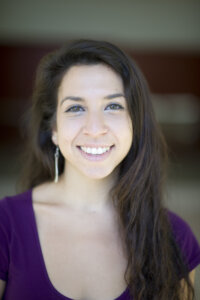What happened to all the women in all those a cappella Hanukkah videos?
When it comes to viral holiday content, sometimes it can seem like a man’s world out there
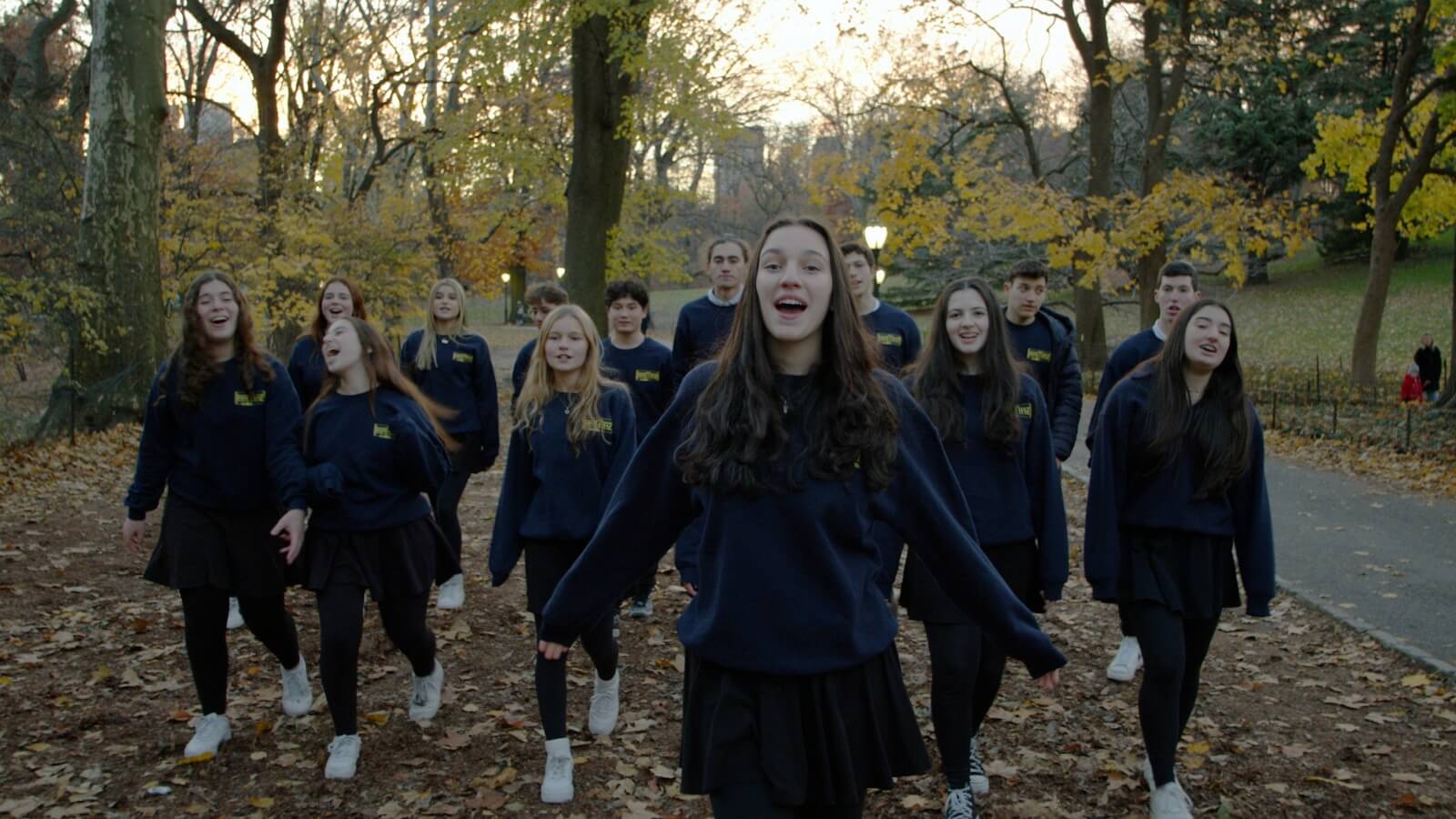
Graphic by Angelie Zaslavsky
Plenty has changed about holiday a cappella videos since “Candlelight” exploded on YouTube over a decade ago like a 21st-century Hanukkah miracle no one thought to pray for: A group of singers, fittingly called the Maccabeats, hoped their video would bring joy to their family and friends. They ended up reaching millions of strangers, too.
The videos also multiplied. One group became several — as Six13 and Y-Studs A Cappella also became reliable video-makers. Productions became more elaborate. Parodies remained king, but sometimes pop songs made way for Broadway or Hollywood hits. Occasionally, serious ballads replaced lighthearted tunes, and once in a while a familiar holiday song or prayer took center stage.
But one thing has remained constant. The videos we’ve come to expect — the ones that now arrive without fail every Hanukkah and often for Passover and sometimes Purim and Rosh Hashanah too, that keep going viral year after year, that reach hundreds of thousands and sometimes millions of views — are all quite male (and quite pale, for that matter).
There’s a vibe: a group of guys singing together. At first glance over a decade ago, perhaps that wasn’t so unusual. Jewish or not, single-gender a cappella groups are typical on college campuses and beyond (though some groups in recent years have made the decision to leave gender labels behind). And in some parts of the Jewish world, segregation between genders is commonplace.
But as the years went by and video after video got passed around, it became clear most viewers were only seeing men singing. Among the super viral hits that have comprised this modern tradition, you’d be hard pressed to find examples from a mixed-gender or all-women group. In fact, it’s hard to find examples of any women singing at all.
If to be Jewish is to ask questions, then let’s ask this one, which has gotten louder and frankly impossible to ignore: Why aren’t any women singing in those viral holiday a cappella videos?
The first why
You can break the why down into two parts: Why don’t the groups that put out videos like clockwork expand to include women or feature women singing as guests in their videos? And why don’t other groups that already include a more diverse gender mix put out viral videos of their own?
When it comes to the core players in this niche genre, the somewhat flippant answer is simply that they’re all-men groups, as so many a cappella groups have been, whether Jewish or not, religious or secular. Two of the three — the Maccabeats and the Y-Studs — were originally founded at the men’s college of Yeshiva University.
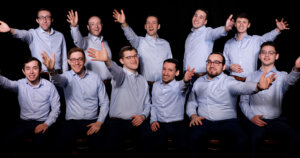
“There’s a difference sonically,” said Mordy Weinstein, a member of Six13 who also founded the Y-Studs as a college student (he left the group when he graduated). While all-men groups might be more likely to miss out on the upper range of notes, they’re also more likely to have members who can hit lower notes, he said. “All-male singing tends to sound richer and fuller.” Weinstein, for the record, was at one time the president of the coed Jewish a cappella group Tizmoret and still sings in coed settings himself.
But the reasons that all-men groups stay that way go beyond their origins or inertia. The deeper answer hinges on the concept of kol isha, which literally translates to “a woman’s voice” and refers to interpretations of the Talmud common in Orthodox Judaism that prohibit a man from hearing a woman sing. So whether they’re following their own personal observance or taking those of their audience into account, the groups have religious reasons to limit their membership. Also business reasons.
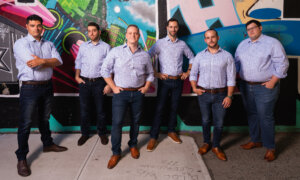
“Six13 always wanted to appeal to the largest number of people possible within the Jewish spectrum,” said Weinstein, who now directs the choir at the Yeshivah of Flatbush and works at the Moriah School in New Jersey.
“So because everybody in Judaism is totally fine listening to all men sing, and not everybody is totally fine listening to women sing, the smart marketing move and branding move would be to appeal to as many people as possible,” he added. “The best way to do that is by making sure that everybody can listen, and that’s by having all men.”
Becca Tanen wasn’t surprised this modern tradition was dominated by men. In fact, she’d have been more surprised if it weren’t.
“I’ve been conditioned to not expect women’s voices to be included,” said Tanen, a member of Makela, the Washington D.C.-based Jewish a cappella group for singers of all ages, faiths, and identities. Tanen, who works in acquisitions at the Library of Congress, grew up modern Orthodox, frequenting some spaces that were more traditional and switching to a more pluralistic setting in middle school in part so that she could sing in the choir. “Because of the complete lack of inclusion during a very formative time in my life, there was an implicit understanding and expectation that there isn’t a place or a space for me to be front and center here,” she said.
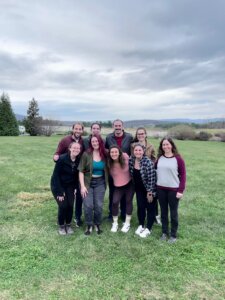
It’s no secret, said Daniel Henkin, Tizmoret’s longtime professional music director and director of music at the Ramaz Upper School in New York City. The lack of gender diversity in some of the most prominent groups comes down to kol isha. It’s heightened, in his view, by the primacy of Orthodoxy in American Judaism today and attempts to cater to the “frumest common denominator” in any given community and the Jewish population at large. “The moment you include a female singer, much of the Orthodox community will consider it treyf and they won’t listen to it.” There’s a cultural and economic reality, said Henkin, who works with all coed groups that are simply not invited to perform in as many spaces. And though there are some voices within Orthodoxy pushing for change, “I don’t know if it’s changing anytime soon.”
Weinstein believes kol isha, plus demand for music the Orthodox community can listen to on Shabbat and other days when instruments are not allowed, is intrinsically tied to the rise and success of all-men Jewish a cappella groups. Jordan B. Gorfinkel, who uses the arts to promote Judaism and, like Henkin, has been heavily involved in launching contemporary Jewish a cappella over the last three decades, agrees. When instruments aren’t an option, “Here comes a cappella to save the day,” said Gorfinkel, who is co-principal of KZYS Productions, the company that manages the Y-Studs. “Jewish a cappella has proliferated because people need it and love it,” especially in the Orthodox world.
While Jews of other denominations may not subscribe to religious laws that limit them to music sung by men or without instruments, that doesn’t mean their beliefs and unconscious biases are irrelevant to the lack of diversity in this genre. Di Stein — who works on the Mental Health First Aid team at at the National Council for Mental Wellbeing and joined Makela in 2019 — described the image of nice Jewish boys who for the most part present as white and cisgender and dress in crisp button-down shirts. “That’s what people think of when they think of Jews,” said Stein, who is nonbinary and uses the pronouns they/them, adding that this kind of image feels recognizable and “safe,” a word they kept coming back to. “It’s a lot safer than like your radical Jewish friends who protest AIPAC.”
Does it matter?
For a few days in September, the internet was flooded with home videos of young Black girls watching the newly released teaser for Disney’s live-action remake of “The Little Mermaid,” starring Halle Bailey in the title role. For some, there’s a moment of confusion before they realize that’s Ariel — a beautiful Black mermaid singing a soulful melody. But when they do, their eyes widen and their jaws drop. In one, a 3-year-old sprawled on the couch suddenly sits straight up, a smile overtaking her entire face. “I think she’s brown!” she says. “Brown Ariel. Brown Ariel is cute!”
The attention those videos garnered, including a reaction from Bailey herself, felt like a moment of collective recognition of the power of representation. In some ways, holiday a cappella videos have been a vehicle for Jewish representation in a Christian-dominated society. “As American Jews we are always looking at finding ourselves in American culture,” said Rabbi Sara Zober of Temple Sinai, a Reform congregation in Reno, who describes herself on her website as a “convert, rabbi, Latina, mom, wife, musician.” That’s why, she guesses, parodies of major mainstream hits are so central to the enterprise and so darn effective.
The videos were a start, breaking through most successfully at a time of year when it’s easy to feel surrounded at best and suffocated at worst by Christmas in America.
“I remember when those videos first came out. It was exciting to see representation of Jews in pop(-ish) culture that felt more modern and contemporary and challenged a lot of stereotypes,” said Ariella Kasmer-Jacobs, a member of the mixed-gender, Boston-area, post-collegiate Jewish a cappella group Honorable Menschen and a graduate student in theater education at Emerson College. It’s not a bad or negative representation, Kasmer-Jacobs said. The videos felt joyous, she added, and she loved seeing them become a phenomenon that reached outside the Jewish community. “But there hasn’t really been a push any further past that.”
More than a decade later, the breakthrough hasn’t expanded to reflect the diversity of American Jews. Some of the immensely popular videos do now depict women, but they’re still not singing. And Jews of color are notably missing as well. Jewish holiday a cappella videos, in other words, haven’t had their Black Ariel moment.
“Little kids who are Jewish and see these things over their parents’ shoulders, or have it put in front of them, see one type of Judaism and then one type of Jewish person,” Stein said. So when it comes to young Jewish girls, kids of color, kids with a gender identity beyond the binary, and anyone else who doesn’t look like the guys in the videos, “there’s no example of Jewish songs for them in a mainstream world.” The same is true for observers outside the Jewish world, Stein said. “People who are looking at Jews only know one type of Jew exists.”
Like Kasmer-Jacobs, Stein wants to be clear they’re glad there’s Jewish representation in a fun and lighthearted context. “It’s good when a bunch of Jewish kids get kind of popular on social media for a minute,” they said. At the same time, “We don’t see ourselves and other people don’t see us, if that’s all that’s gonna get popular every year.”
The men I spoke to didn’t disagree. On the contrary. “It would be so important for a little kid to see that they are not marginalized in these major marketing things that represent, seemingly, Jewish education and Jewish life,” Six13’s Weinstein said. “If you’re raising daughters in a Jewish community and you want them to feel a sense of belonging, to feel a sense of ownership and responsibility towards that community, then being able to see that represented visually in the same way is, absolutely, for sure, it’s really, really important,” he said. “It’s all the more reason why somebody needs to just do it.” And while he’s sung in coed contexts and toyed with the idea of creating a new group, he’s both strapped for time and feeling like it may not be his place, though he’d be happy to offer his advice to anyone who wants to take on the task.
It’s true that holiday a cappella videos are just one niche subset of one segment of Jewish music. They matter because of their incredible visibility. But it wouldn’t be fair to put a disproportionate burden on them either. The reality is that they reflect larger conversations and issues. They’re hardly the only example or space that makes it hard for some Jews to see where they belong. And it’s not solely on them to answer for it.
When Marni Loffman was a student at Wesleyan, they had a solo with their a cappella group (it wasn’t a Jewish group). Loffman, who identifies today as nonbinary and uses the pronouns they/them, had what they call a “Conservadox” upbringing in New Jersey, navigating among communities with different practices and levels of observance. Their high school followed the rules of kol isha and, because they were assigned female at birth, that meant they couldn’t sing there. They were so anxious performing that solo that their body and voice shook.
“It was really, really hard for me,” said Loffman, a musician and educator in residence at Beth Am Israel Congregation in Pennsylvania and a content creator who goes by @singing_jewess on TikTok. “I felt really sad that I did not have opportunities to build confidence in relationship to my voice. And also just that I was in an environment that didn’t want to hear my voice or thought of my voice as a problem,” they said. “I really felt like a guest in a lot of spaces for a very long time, both Jewishly and musically.”
Stein spoke in their own way about the years they spent “trying to find Judaism that is for me.” And Kasmer-Jacobs, who also considers music an integral part of her connection to Judaism, struggled to grow up in a community where her voice wasn’t meant to be heard. “That’s one among many reasons why I’ve found myself leaning towards more egalitarian spaces,” said Kasmer-Jacobs, who came from a musical household where kol isha wasn’t an issue — and has particularly fond memories of her grandfather, a Holocaust survivor, singing — but attended a school where the girls’ choir didn’t perform in front of mixed audiences. “If music is the way that I connect to Judaism, then it doesn’t make sense for me to be in spaces where my voice doesn’t matter or isn’t heard.”
But none of this begins or ends with a cappella videos. “We’ve been working on this for years,” said Rabbi Rayzel Raphael, a singer/songwriter and founder of “Adding Our Voices: The Jewish Feminist Songbook and Gender-Inclusion Initiative.” “What you’re seeing is a new incarnation of this same issue of where’s women’s representation? Whether it’s in the arts, whether it’s in music, whether it’s in liturgy,” she said. We’re only a few decades along in “a revolution of putting women’s voices into this tradition.”
“It’s really important that we have people singing and making music in different ways,” Loffman said. “To make sure that all Jews know this tradition is their home and this cultural life is their home.” One of the drivers of their work today is “bringing to life the diversity of Jewish culture as a part of how we define Jewish belonging, and redefining Jewish in a way that allows many people to feel a sense of belonging in it.”
The second why
Here’s the thing: There are women and nonbinary folks in Jewish a cappella. And there are all-women and mixed-gender Jewish a cappella groups. So why aren’t other groups throwing their proverbial hats in the ring?
“There is room for any segment of our population to be making these videos,” Gorfinkel said. Some Jewish performers — like the Y-Studs, Maccabeats, and Six13 — are already doing it, he said. “If there are people who feel like they are not identifying with it, or they are not being represented in it,” he added, “go and do it. Nobody’s stopping you. In fact, I am doing the opposite. I’m saying I want you to, and I will support you. Come talk to me. I’ll give you all the advice in the world that you want.”
“If you want to see women in Jewish a cappella videos, make them. It’s that simple,” Gorfinkel said. But even he acknowledges that it’s not, perhaps, all that simple, and that he’s seen firsthand that no matter what segment of the Jewish world you look at, women tend to get less support than men.
The reasons that undergird this second why are a little more varied than, basically, kol isha. But the biggest obstacle, as most people I spoke with told me, is resources. The kind of highly produced and polished videos we take for granted by now require a lot of time and work — including arranging music, writing lyrics, preparing locations and costumes, shooting multiple takes, recording the audio, mixing and editing, and promoting — and they also cost money.
Different groups have different business models. Some have mostly paid gigs, others take local community gigs that don’t come with compensation. Some can perform in all corners of the Jewish world, others are much more limited to liberal spaces where all their members can sing. Previous viral videos typically mean a flood of gig inquiries, which in turn help pay for the next videos, and on and on the cycle goes.
“To make a video like that takes a lot of investment,” said Kasmer-Jacobs, who is a freelance teaching artist and a research assistant at Emerson’s Engagement Lab on top of being a student. In a post-collegiate group where everyone also works, “to come up with the financial and human capital to create a video like that is difficult.” Plus, she added, the expectations for production quality today are higher than they were when “Candlelight” first lit up YouTube, and no one in her group is an expert videographer or mixer. “It takes so much work and the chances of going viral are so small, it’s not worth it.”
And, as several people I talked to wondered, would the chances of going viral be stymied by the fact that at least some portion of the Jewish population wouldn’t listen to a video with women singing, let alone pass it around? If you dig deep enough, you will start to stumble on an existing video here and there, but you’ll notice it didn’t break past a few hundred or a couple thousand views, peanuts in comparison to the reach of the megahits in this tradition. Is there a reason you have to look so hard to find them? Even outside of Jewish spaces, a few noted, they’d always gotten the sense that all-men a cappella groups were more popular.
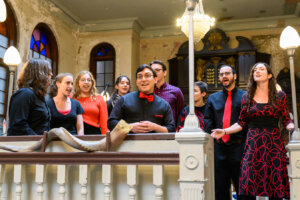
It’s one thing for the groups that have been doing this for years to build on their knowledge and past successes every year. As Tanen put it, once they’re already doing it and it’s working, “there’s no reason for them not to continue putting them out.” But it’s another thing to start from scratch more than a decade in.
Besides, they’re not sure they want to. “I aim to build (and be a part of) community through music,” Kasmer-Jacobs said. “I have no aims to become internet famous, and our local, in-person gigs feel a lot more valuable and gratifying to me than posting a video online.” For Stein and their fellow Makela members, a fancy video or a CD hasn’t felt like a priority either. When they recently had some extra money to pool, they preferred to spend it on a retreat weekend to sing and spend time together. “The point of Makela is community building and community building not online,” they said. “It’s a lot better to sing with 50 people in the room with you than reaching a couple thousand you’ll never meet.
There’s also the added layer of being a woman or femme-presenting person on the internet. “I’m pretty fearful of online presences,” said Stein who confessed to feeling wary of doxxing and hateful comments. “I feel safer in a room full of people than I ever will with my picture online,” they added. Tanen, too, said she’d be bracing for significant trolling or worse.
And at the end of the day, the parody genre itself just doesn’t appeal to everyone. “It always struck me as a little bit cheesy,” Tizmoret’s Henkin said. “I personally was never drawn to that. And I never wanted to hop on that bandwagon.” But by the end of our conversation, he was thinking about it in a new way. “I think what you’re asking is, ’Couldn’t a group like Tizmoret offer a coed alternative to these? I’ve never thought of it that way,” he said. “That’s the only argument I’ve heard that appeals to me.”
No matter what a mixed-gender or all-women group might want to create, Rabbi Zober emphasized that it’s not on them alone to make change without support. Especially not on women juggling jobs and household responsibilities — typically more so than men. “One of the things about the Jewish community is that when we value something, we spend money on it,” she said. In this case, she asked, could a philanthropist donate funds to make a video possible? Could an entertainment industry insider offer them time in a studio? Could a local JCC provide childcare if needed? “It is our responsibility as a Jewish community in America to remove some of these barriers,” when it comes to holiday a cappella videos and so much more.
Where the women are singing
Of course there are plenty of ways you can, right this very minute, see and hear women singing about Jewish holidays online. Mixed-gender and all-women a cappella groups have YouTube pages with videos of live performances and a few COVID-era Zoom-square style videos — including the aforementioned Tizmoret, Makela and Honorable Menschen.
You can steer further away from a cappella to find some older, widely shared videos from the Israel-based Fountainheads, including three for Hanukkah. You can find Hanukkah songs from Sarah Aroeste (featuring Kosha Dillz), MC Flow, and Yonina (three videos Lior Zaltzman pointed to in a 2018 Hey Alma article pushing for diversity in Hanukkah a cappella videos). You can check out these examples of videos Rabbi Raphael shared with me from the Women Cantors’ Network or, soon, explore the forthcoming online archive for the Adding Our Voices project. You can look to platforms like TikTok, where Loffman is posting gorgeous renditions of prayers and melodies. In short, “There are a lot of Jewish creators creating Hanukkah content that are not the Maccabeats,” Loffman said.
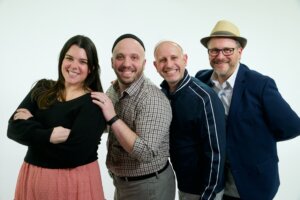
And it turns out that this year, you can look for two brand new Hanukkah a cappella videos featuring women singing. The Chicago-based Jewish a cappella group Listen Up! Jewish Vocal Band — which you might recognize from their Hebrew remix of “Old Town Road” or their Yiddish remix of “I Feel Fine” — just released their first Hanukkah video since 2017. Their take on Camila Cabello’s hit “Bam Bam” features the group’s self-described “lady singer” Kadi House, Director of Youth Engagement at Am Shalom, a reform congregation north of Chicago.
“It just seems like that’s what people want,” House said of the holiday parody videos. The group is hoping it helps them ramp back up and get their name out there after a difficult couple of years during the pandemic. And House hopes her presence might help remind people that “you don’t have to be a man to do Jewish a cappella. Anybody can do it.”
Another new video features the Ramaz Chamber Choir, a coed high school group that’s directed by Henkin, singing an original Hanukkah song by Risa Binder, a singer-songwriter who turned to teaching on Zoom during the pandemic, and her student-turned-collaborator Becky Rosenheim.
Around this time in 2020, the lyrics to “Song of Light” came to Rosenheim all of a sudden, and when she brought them to Binder, the latter immediately heard the melody in her head, and instinctively said it should be an a cappella song. It tells the story of Hanukkah, but there’s another impetus and message. “Even when the world around us seems dark, we can access an inner source of light and strength,” Rosenheim said. Henkin did the arrangement and supplied the choir.
Will these Hanukkah a cappella videos featuring women singing go viral? Will we watch and share? Will we see more of them in the future? Will those of us who can, offer financial and other support to fund all kinds of artistic expressions from a broad array of Jewish artists?
Rabbi Zober put it this way: “May it come speedily and in our days.”
